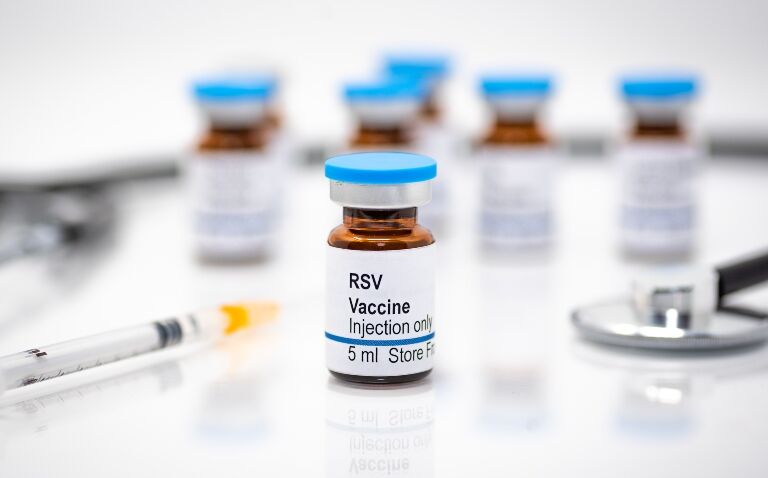The UK is set to become the first country in the world to have a national vaccination programme to protect both newborns and older adults against respiratory syncytial virus (RSV).
The vaccination rollout – which will start from 1 September 2024 in England, Wales and Northern Ireland, and from 12 August 2024 in Scotland – includes a vaccine for pregnant women over 28 weeks to help protect their newborn babies, and a routine programme for those aged over 75, which includes a one-off campaign for people aged 75 to 79.
These are the groups at the greatest risk from RSV, based on advice from the Joint Committee on Vaccination and Immunisation (JCVI) from June 2023.
The vaccination programme announcement follows the publication of an open letter in March 2024 signed by over 2,000 paediatricians and healthcare professionals from around the UK calling on the Government to act on the JCVI advice as soon as possible.
Commenting on the latest announcement, Dr Mike McKean, vice president for policy at the Royal College of Paediatrics and Child Health, which led the campaign, said: ‘We’re delighted that the calls of thousands of paediatricians and health professionals for a much-needed RSV programme have been heard. Campaigning for an RSV vaccine has been a key issue for the College for many years now and today’s announcement represents a huge step forward for child health and the paediatric workforce in England and Scotland.’
RSV vaccine eligibility and evidence
All adults turning 75 years of age on or after 1 September 2024 will be eligible for the routine programme and should be offered a single dose of the RSV vaccine on or after their 75th birthday.
A one-off catch-up campaign for those aged 75 to 79 years old as of 1 September 2024 will aim to complete the majority by 31 August 2025.
In line with JCVI guidance, individuals will remain eligible until the day before their 80th birthday, with the exception of people who turn 80 in the first year who have until 31 August 2025 to get vaccinated.
All women who are at least 28 weeks pregnant on 1 September 2024, will be offered a single dose of the RSV vaccine. After that, pregnant women will become eligible as they reach 28 weeks gestation and remain eligible up to birth.
Maternal RSV vaccination reduces the risk of the virus leading to severe bronchiolitis by 70% in the first six months of life, after which the risk of severe infection is much lower.
The UK’s RSV vaccination programme will use the same vaccine to protect both newborns and older adults against RSV, which is Pfizer’s bivalent recombinant vaccine called Abrysvo, was licensed by the Medicines and Healthcare products Regulatory Agency in November last year.
In one trial published in the New England Journal of Medicine, the Pfizer RSV vaccine given during pregnancy was shown to be effective against severe RSV-associated lower respiratory tract illness in infants up to six months old.
A second trial showed the vaccine prevented RSV-associated lower respiratory tract illness and RSV-associated acute respiratory illness in adults over 60 years of age.
Reducing RSV hospital admissions
NHS England data show RSV accounts for around 33,000 NHS hospitalisations in children aged under five in the UK each year, and is responsible for 20-30 infant deaths, posing a significant challenge to child health services each winter. It also causes around 9,000 hospital admissions in those aged over 75.
It is hoped the new vaccination programme will mitigate these risks, free up thousands of hospital bed days and help avoid hundreds of deaths each year.
Minister for public health and prevention, Andrew Gwynne, said he had seen the devastating effects of RSV firsthand.
‘My own grandson contracted RSV when he was just days old, leading to weeks in intensive care and a lifelong impact on his health. I don’t want anyone to go through what he went through.
‘Not only will this vaccine save lives and protect the most vulnerable, it will help ease pressure on our broken NHS, freeing up thousands of hospital beds as we head into winter.’
Dr McKean, added: ‘This newly announced programme has the potential to transform child health services during the winter months by reducing hospital admissions and could even save young lives. A reduction in RSV cases annually would allow us to focus on the many other children and young people requiring emergency care over winter months.
‘Vaccinations play a crucial role in protecting child health, but we are seeing a worrying decline in uptake across many routine childhood immunisations. As paediatricians, we want to continue to champion the use of vaccinations to win the battle against these dangerous and preventable infections.’
Widespread support
Dr Adrian Boyle, president of the Royal College of Emergency Medicine also welcomed the announcement, saying: ‘We greatly welcome the introduction of a national RSV vaccination programme to reduce the risk to children and ease the spike in seasonal pressure experienced by already overstretched [Emergency] Departments.
‘RSV is a nasty and potentially very serious illness which each year sees tens of thousands of poorly children brought into Emergency Departments by worried parents.
‘We commend the excellent work done by the Royal College of Paediatrics and Child Health in calling for the implementation of this vaccination programme and we look forward to seeing the positive impact felt by families and medical staff in the coming winter as a result.’
Dr Christopher Johnson, head of vaccine preventable disease programme at Public Health Wales said: ‘The RSV vaccine has the potential to save 1,000 young children every year in Wales from hospitalisation and could save the lives of over 125 older people each year.
‘It is a game-changing new vaccination programme that will protect thousands of our most vulnerable from getting ill in the first place, or significantly reducing the likelihood of severe infection, keeping people out of hospital and from needing to see a GP, and enabling more people to benefit from NHS services.’










